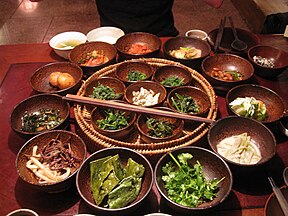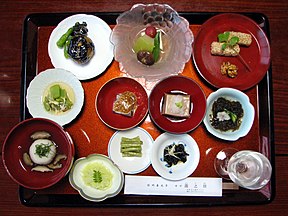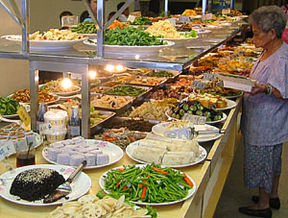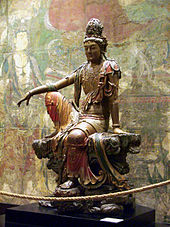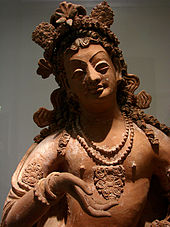Early Buddhism
The earliest surviving written accounts of Buddhism are the Edicts of Asoka written by King Asoka,
a well-known Buddhist king who propagated Buddhism throughout Asia and
is honored by both Theravada and Mahayana schools of Buddhism. The
authority of the Edicts of Asoka as a historical record is suggested by
the mention of numerous topics omitted as well as corroboration of
numerous accounts found in the Theravada and Mahayana Tripitakas written
down centuries later. Asoka Rock Edict 1 dated to c. 257 BCE mentions the prohibition of animal sacrifices in Asoka’s Maurya Empire
as well as his commitment to vegetarianism; however, whether the Sangha
was vegetarian in part or in whole is unclear from these edicts.
However, Asoka’s personal commitment to, and advocating of,
vegetarianism suggests Early Buddhism (at the very least for the
layperson) most likely already had a vegetarian tradition (the details
of what that entailed besides not killing animals were not mentioned,
and therefore are unknown.)
Views of different schools
There
is a divergence of views within Buddhism as to whether vegetarianism is
required, with some schools of Buddhism rejecting such a requirement.
The first precept in Buddhism is usually translated as "I undertake the
precept to refrain from taking life". Some Buddhists see this as
implying that Buddhists should avoid meat consumption,
whereas other Buddhists argue that this is untrue. Some Buddhists do
strongly oppose meat-eating on the basis of scriptural injunctions
against flesh-eating accorded in Mahayana sutras.
Mahayana view
According to the Mahāyāna Mahāparinirvāṇa Sūtra, a Mahayana sutra purporting to give Gautama Buddha's
final teachings, the Buddha insisted that his followers should not eat
any kind of meat or fish, even those not included in the 10 types, and
that even vegetarian food that has been touched by meat should be washed
before being eaten. Also, it is not permissible for the monk or nun
just to pick out the non-meat portions of a diet and leave the rest: the
whole meal must be rejected.
The Aṅgulimālīya Sūtra quotes a dialogue between Gautama Buddha and Manjushri on meat eating:
Mañjuśrī asked, “Do Buddhas not eat meat because of the tathāgata-garbha ?”
The Blessed One replied, “Mañjuśrī, that is so. There are no beings who have not been one’s mother, who have not been one’s sister through generations of wandering in beginningless and endless saṃsāra. Even one who is a dog has been one’s father, for the world of living beings is like a dancer. Therefore, one’s own flesh and the flesh of another are a single flesh, so Buddhas do not eat meat. “Moreover, Mañjuśrī, the dhātu of all beings is the dharmadhātu, so Buddhas do not eat meat because they would be eating the flesh of one single dhātu.”
Certain Mahayana sutras
do present the Buddha as very vigorously and unreservedly denouncing
the eating of meat, mainly on the grounds that such an act is linked to
the spreading of fear amongst sentient beings
(who can allegedly sense the odour of death that lingers about the
meat-eater and who consequently fear for their own lives) and violates
the bodhisattva's fundamental cultivation of compassion. Moreover, according to the Buddha in the Angulimaliya Sutra,
since all beings share the same "Dhatu" (spiritual Principle or
Essence) and are intimately related to one another, killing and eating
other sentient creatures is tantamount to a form of self-killing and
cannibalism. The sutras which inveigh against meat-eating include the Nirvana Sutra, the Shurangama Sutra, the Brahmajala Sutra, the Angulimaliya Sutra, the Mahamegha Sutra, and the Lankavatara Sutra. In the Mahayana Mahaparinirvana Sutra,
which presents itself as the final elucidatory and definitive Mahayana
teachings of the Buddha on the very eve of his death, the Buddha states
that "the eating of meat extinguishes the seed of Great Kindness",
adding that all and every kind of meat and fish consumption (even of
animals found already dead) is prohibited by him. He specifically
rejects the idea that monks who go out begging and receive meat from a
donor should eat it: ". . . it should be rejected . . . I say that even
meat, fish, game, dried hooves and scraps of meat left over by others
constitutes an infraction . . . I teach the harm arising from
meat-eating." The Buddha also predicts in this sutra that later monks
will "hold spurious writings to be the authentic Dharma" and will
concoct their own sutras and falsely claim that the Buddha allows the
eating of meat, whereas he says he does not. A long passage in the
Lankavatara Sutra shows the Buddha speaking out very forcefully against
meat consumption and unequivocally in favor of vegetarianism, since the
eating of the flesh of fellow sentient beings is said by him to be
incompatible with the compassion that a Bodhisattva should strive to
cultivate. This passage has been seen as questionable. In a translation by D. T. Suzuki, a note is made that this section:
This chapter on meat-eating is another later addition to the text, which was probably done earlier than the Rāvaṇa chapter....It is quite likely that meat-eating was practised more or less among the earlier Buddhists, which was made a subject of severe criticism by their opponents. The Buddhists at the time of the Laṅkāvatāra did not like it, hence this addition in which an apologetic tone is noticeable.
In several other Mahayana scriptures, too (e.g., the Mahayana jatakas), the Buddha is seen clearly to indicate that meat-eating is undesirable and karmically unwholesome.
Some suggest that the rise of monasteries in Mahayana tradition
to be a contributing factor in the emphasis on vegetarianism. In the
monastery, food was prepared specifically for monks. In this context,
large quantities of meat would have been specifically prepared (killed)
for monks. Henceforth, when monks from the Indian geographical sphere
of influence migrated to China
from the year 65 CE on, they met followers who provided them with money
instead of food. From those days onwards Chinese monastics, and others
who came to inhabit northern countries, cultivated their own vegetable
plots and bought food in the market. This remains the dominant practice in China, Vietnam and part of Korean Mahayanan temples.
Mahayana lay Buddhists often eat vegetarian diets on the
vegetarian dates (齋期). There are different arrangement of the dates,
from several days to three months in each year, in some traditions, the
celebration of the bodhisattva Avalokitesvara's birthday, enlightenment and leaving home days hold the highest importance to be vegetarian.
Theravada View
The Buddha in the Anguttara Nikaya 3.38 Sukhamala Sutta,
before his enlightenment, describes his family being wealthy enough to
provide non-vegetarian meals even to his servants. After becoming
enlightened, he accepted any kind of food offered with respect as alms,
including meat, but there is no reference of him eating meat during his seven years as an ascetic.
In the modern era, the passage cited below has been interpreted as allowing the consumption of meat if it is not specifically slaughtered for the recipient:
… meat should not be eaten under three circumstances: when it is seen or heard or suspected (that a living being has been purposely slaughtered for the eater); these, Jivaka, are the three circumstances in which meat should not be eaten, Jivaka! I declare there are three circumstances in which meat can be eaten: when it is not seen or heard or suspected (that a living being has been purposely slaughtered for the eater); Jivaka, I say these are the three circumstances in which meat can be eaten. —Jivaka Sutta, MN 55 , unpublished translation by Sister Uppalavanna
Also in the Jivaka Sutta, Buddha instructs a monk or nun to accept,
without any discrimination, whatever food is offered in receiving alms
offered with good will, including meat, whereas the Buddha declares the
meat trade to be wrong livelihood in the Vanijja Sutta, AN 5:177
Monks, a lay follower should not engage in five types of business. Which five? Business in weapons, business in human beings, business in meat, business in intoxicants, and business in poison. These are the five types of business that a lay follower should not engage in.
But this is not, strictly speaking, a dietary rule. The Buddha, on
one particular occasion, specifically refused suggestions by Devadatta to institute vegetarianism in the Sangha.
In the Amagandha Sutta in the Sutta Nipata, a vegetarian Brahmin confronts Kassapa Buddha
(a previous Buddha before Gautama Buddha) in regard to the evil of
eating meat. The Buddha countered the argument by listing acts which
cause real moral defilement and then at the end of the verse, he
emphasized that the consumption of meat is not equivalent to those acts.
("... this is the stench giving defilement, not the consumption of
meat").
- "[t]aking life, beating, wounding, binding, stealing, lying, deceiving, worthless knowledge, adultery; this is stench. Not the eating of meat." (Amagandha Sutta).
There were monastic guidelines prohibiting consumption of 10 types of meat: that of humans, elephants,
horses, dogs, snakes, lions, tigers, leopards, bears and hyenas. This
is because these animals can be provoked by the smell of the flesh of
their own kind, or because eating of such flesh would generate a bad
reputation for the Sangha.
Paul Breiter, a student of Ajahn Chah, states that some bhikkhus in Thailand choose to be vegetarian and that Ajahn Sumedho encouraged supporters to prepare vegetarian food for the temple.
In the Pali Canon, Buddha once explicitly refused suggestion by Devadatta to institute vegetarianism in the monks' Vinaya.
Vajrayana
Some Vajrayana practitioners both drink alcohol and eat meat. Many traditions of the Ganachakra which is a type of Panchamakara puja
prescribed the offering and ingestion of meat and alcohol, although
this practice is now often only a symbolic one, with no actual meat or
alcohol ingested.
One of the most important tertöns of Tibet, Jigme Lingpa, wrote of his great compassion for animals:
Of all his merit-making, Jigme Lingpa was most proud of his feelings of compassion for animals; he says that this is the best part of his entire life story. He writes of his sorrow when he witnessed the butchering of animals by humans. He often bought and set free animals about to be slaughtered (a common Buddhist act). He ‘changed the perception’ of others, when he once caused his followers to save a female yak from being butchered, and he continually urged his disciples to forswear the killing of animals.
In The Life of Shabkar, the Autobiography of a Tibetan Yogin, Shabkar Tsokdruk Rangdrol wrote:
Above all, you must constantly train your mind to be loving, compassionate, and filled with Bodhicitta. You must give up eating meat, for it is very wrong to eat the flesh of our parent sentient beings.
The 14th Dalai Lama
and other esteemed lamas invite their audiences to adopt vegetarianism
when they can. When asked in recent years what he thinks of
vegetarianism, the 14th Dalai Lama has said: "It is wonderful. We must
absolutely promote vegetarianism." The Dalai Lama tried becoming a vegetarian and promoted vegetarianism. In 1999, it was published that the Dalai Lama would only be vegetarian every other day and partakes of meat regularly. When he is in Dharamsala, he is vegetarian, but not necessarily when he is outside Dharamsala.
Paul McCartney has taken him to task for this and wrote to him to urge
him to return to strict vegetarianism, but "[The Dalai Lama] replied [to
me] saying that his doctors had told him he needed [meat], so I wrote
back saying they were wrong."
Tenzin Wangyal Rinpoche became vegetarian in 2008.
Arjia Rinpoche became vegetarian in 1999.
On 3 January 2007, one of the two 17th Karmapa, Urgyen Trinley Dorje,
strongly urged vegetarianism upon his students, saying that generally,
in his view, it was very important in the Mahayana not to eat meat and
that even in Vajrayana students should not eat meat:
There are many great masters and very great realized beings in India and there have been many great realized beings in Tibet also, but they are not saying, "I'm realized, therefore I can do anything; I can eat meat and drink alcohol." It's nothing like that. It should not be like that.
According to the Kagyupa school, we have to see what the great masters of the past, the past lamas of Kagyupas, did and said about eating meat. The Drikung Shakpa [sp?] Rinpoche, master of Drikungpa, said like this, "My students, whomever are eating or using meat and calling it tsokhor or tsok, then these people are completely deserting me and going against the dharma." I can't explain each of these things, but he said that anybody that is using meat and saying it is something good, this is completely against the dharma and against me and they completely have nothing to do with dharma. He said it very, very strongly.
Common practices
Theravada
In the modern world, attitudes toward vegetarianism vary by location. In Sri Lanka and the Theravada countries of South East Asia, monks are obliged by the vinaya
to accept almost any food that is offered to them, including meat,
unless they suspect the meat was slaughtered specifically for them.
Chinese, Korean, Vietnamese, and Taiwanese traditions
In China, Korea, Vietnam, Taiwan
and their respective diaspora communities, monks and nuns are expected
to abstain from meat and, traditionally, eggs and dairy, in addition to
the fetid vegetables – traditionally garlic, Allium chinense, asafoetida, shallot, and Allium victorialis (victory onion or mountain leek), although in modern times this rule is often interpreted to include other vegetables of the onion genus, as well as coriander
– this is called pure vegetarianism (純素, chúnsù). Pure Vegetarianism is
Indic in origin and is still practiced in India by some adherents of
Dharmic religions such as Jainism and in the case of Hinduism,
lacto-vegetarianism with the additional abstaintion of pungent or fetid
vegetables. A minority of Buddhist lay believers are year-long
vegetarians in the monastic way. Many lay followers followed monastic
style vegetarianism on Lunar New Year's Eve, Saints days and ancestral
feast days as well as the 1st and 15th day of the lunar calendar. Some
lay followers also followed monastic style vegetarianism on the
six-day,ten-day, Guan-yin (Avalokitesvara) vegetarian, etc., set lunar
calendar schedule. Other Buddhist lay-followers also follow less
stringent forms of vegetarianism. Most Buddhist lay-followers however
are not vegetarians. Some Zhaijiao lay adherents also do not eat any meat.
Japanese traditions
Japan initially received Chinese Buddhism in 6th century. In the 9th century, Emperor Saga
made a decree prohibiting meat consumption, except that of fish and
birds. This remained the dietary habit of Japanese until the
introduction of European dietary customs in the 19th century. Again, around the 9th century, two Japanese monks (Kūkai and Saichō),
introduced Vajrayana Buddhism into Japan, and this soon became the
dominant Buddhism among the nobility. In particular, Saichō, who
founded the Tendai
sect of Japanese Buddhism, reduced the number of vinaya code to 66.
(Enkai 円戒) During the 12th century, a number of monks from Tendai sects founded new schools (Zen, Pure Land) and de-emphasised vegetarianism. Nichiren Buddhism today likewise de-emphasises vegetarianism. However, Nichiren himself practiced vegetarianism. Zen does tend generally to look favourably upon vegetarianism. The Shingon
sect founded by Kūkai recommends vegetarianism and requires it at
certain times, but it is not always strictly required for monks and
nuns.
Tibetan traditions
In Tibet,
where vegetables historically have been scarce, and the adopted vinaya
was the Nikaya Sarvāstivāda, vegetarianism is rare, although the Dalai Lama, the Karmapa, and other esteemed lamas invite their audiences to adopt vegetarianism whenever they can. Chatral Rinpoche
in particular stated that anyone who wished to be his student must be
vegetarian. Contradictory to the compassionate Tibetan Buddhist
traditions in which a sanctity of life, both human and animal, is
cherished, meat is often consumed as a form of sustenance due to lack of
vegetation readily available. For example, Tibetan medicine emphasizes
the necessity to acquire and sustain a balance between the bodily fluids
of wind (rlung), phlegm (bad kan), and bile (mkhns), in which a
meatless diet would disturb and eventually lead to fatigue. The 18th
century Tibetan religious leader Jigmé Lingpa suggested that Tibetan
Buddhists who wish to consume meat, but also do not want to sacrifice
their religious beliefs, should recite a prayer over their plate of meat
in order to purify it before it is consumed. This is said to create a
favorable interconnection between the consumer and the animal, assisting
it to attain a finer rebirth.
